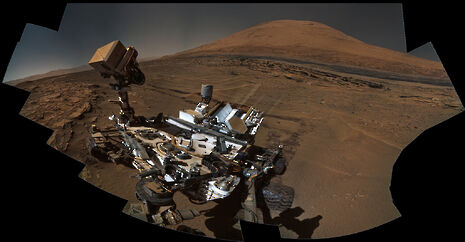We have a moral duty to go to Mars
Varsity’s Science Editor, Shudong Li, calls for personal and multilateral reform to re-ignite manned space exploration – a philosophical journey

When John F. Kennedy announced the Apollo missions in 1961, a fever took its grip across the globe. It would be an easy task to argue the achievements that followed rank among the greatest feats of human engineering, if not human progress. To move from being single-cells to mammals, quadruped to H. sapien, then in 1969 (three billion years from the very beginning), to have in our possession the ability to leave the only unifying constant – that is, Earth – leaves few comparable accomplishments. Even more astonishing is the fact that it only took a space program eight years to gain such capabilities.
Now, in the 21st century, speaking with my friends, the subject of space exploration brings out distain. They express anger at what they see as frivolous spending, squandering taxpayers’ money to send a piece of junk to a useless rock. We have become adrift in a pessimistic spiral regarding the arguably spiritual task of defining our place in the known universe. There has been a descent in public perception, as we have moved timidly from live images broadcast from the moon, to nonchalantly brushing aside news stories about unmanned probes.
Reflecting back on space exploration, we perhaps remember most memorably the Challenger Space Shuttle disaster, a supposed next generation craft which resulted with the deaths of all seven crew members. These men and women will not be forgotten, for they are the few who have sacrificed their lives to take the “leap for mankind”. Their legacy is one which should not end with our generation. So what is stopping us?
This next major step is a manned mission to Mars – by no means a small undertaking. It would likely require a level of inter-governmental cooperation which currently seems impossible. Only recently, a bill was passed by the United States Congress prohibiting NASA cooperation with the Chinese space program on grounds of security. Just six agencies retain programmes with launch capacity, including the European Space Agency, Russian Roscosmos State Corporation, Japan Aerospace Exploration Agency and Indian Space Research Organisation. The infectious paranoia of the Cold War is no longer present, yet we still have the same political and ideological barriers that are preventing us from achieving what is very much a possibility.
There are those who question the moral priorities of investing into an agenda when there is already so much inequality and suffering perpetually permeating actual human lives. There are problems on earth that need to be tackled, but is there not a compromise that can be reached which would allow both issues to be competently engaged? One which would see space programs working in partnership, reducing costs and increasing the capacity of all humankind for space exploration rather than confining ourselves to national boundaries.
Let us not forget, investment into space exploration has already led to a wide-range of ‘spin-off technologies’, including LEDs, artificial limbs and solar cells from NASA alone. Like other financial ventures into science, the immediate benefits are unknown to the best of us however the potential gains are possibly endless. Could the administrator who signed off on the grant funding Sir Alexander Flemming’s research have known he had just saved 200 million lives with a stroke of his pen alone?
“If a lion could speak, we couldn’t understand him” said Wittgenstein; science is the language we use to articulate and expand our knowledge. Our restrictive vocabulary currently does not include that of distant unworldly worlds. Life, no longer defined by the necessity of carbon may exist under conditions unimaginable to us. We do not have the references and foundations to perceive just how different or tantamount they may be. Similar to the confusion and curiosity that would confront one when hearing a lion speak, exploring new planets, stars and galaxies would offer us the same inconceivable insight.
A central tenet of our existence is to understand and further broaden our horizons and we have a duty to humanity to not shy away. This is no simple task, but I am asking and hoping for a change in attitude amongst us all – to set aside our differences and achieve the improbable. It is for more than the gain of technological luxuries and even empirical knowledge; we have before us the opportunity, and ultimately the obligation, to explore the metaphysical.

I leave you with the closing remarks from President John F. Kennedy’s infamous speech at Rice University, Houston, Texas:
“Many years ago the great British explorer George Mallory, who was to die on Mount Everest, was asked why did he want to climb it. He said, ‘Because it is there’. Well, space is there, and we’re going to climb it, and the moon and the planets are there, and new hopes for knowledge and peace are there. And, therefore, as we set sail we ask God’s blessing on the most hazardous and dangerous and greatest adventure on which man has ever embarked.”
For more high-def images from Mars click here.
Links to HD versions of article images: 1 & 2.
 Comment / Anti-trans societies won’t make women safer14 November 2025
Comment / Anti-trans societies won’t make women safer14 November 2025 Comment / Be mindful of non-students in your societies12 November 2025
Comment / Be mindful of non-students in your societies12 November 2025 News / Controversial women’s society receives over £13,000 in donations14 November 2025
News / Controversial women’s society receives over £13,000 in donations14 November 2025 News / Stolen plate returned to Caius after 115 years12 November 2025
News / Stolen plate returned to Caius after 115 years12 November 2025 Theatre / The sultry illusions and shattered selves of A Streetcar Named Desire13 November 2025
Theatre / The sultry illusions and shattered selves of A Streetcar Named Desire13 November 2025








